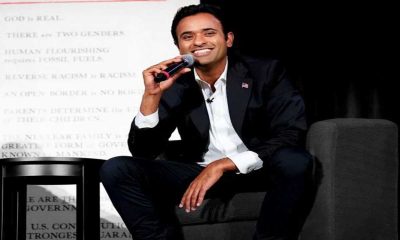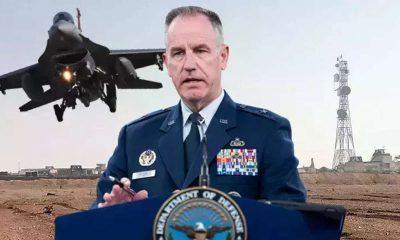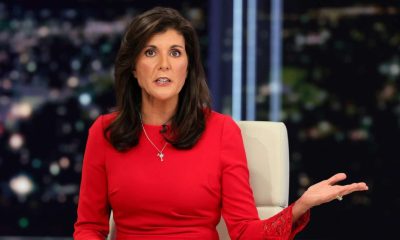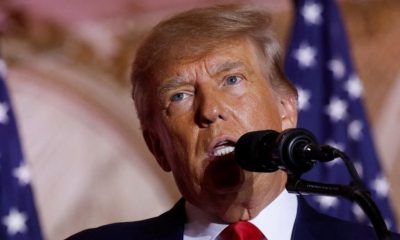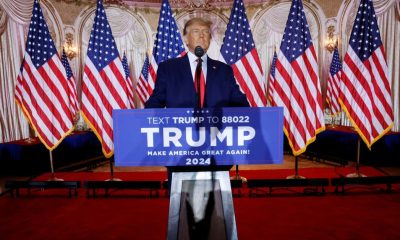Latest world news
Trump and Rouhani Flex Muscles on Nuclear Deal
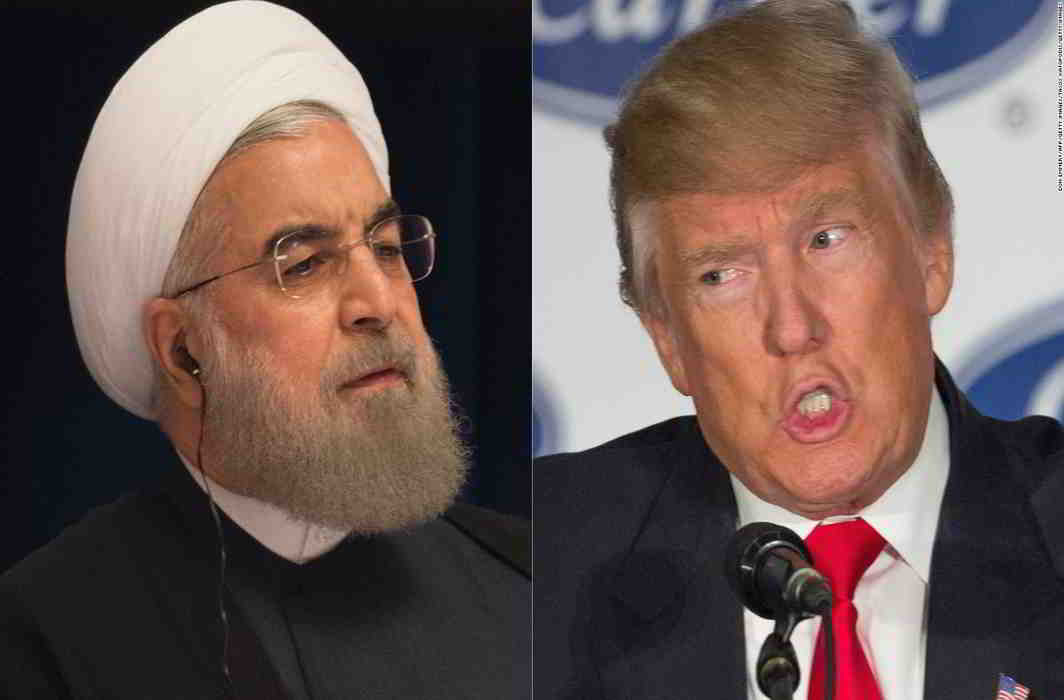
US and Iran differ apart in their views
US President Donald Trump and his Iranian counterpart Hassan Rouhani have maintained their positions intact on nuclear deal, spread of terrorism in the region and if Tehran regime was a “dictator” or most “democratic” establishment in the region. However, nuclear deal was the focal point, where both leaders shared their opinion on the “resolved but vexed” issue to the world community.
Donald Trump, on Tuesday addressed for the first time at UN General Assembly while Hassan Rouhani answered media quaries on the sensitive issues prevailing on the present US administration since January this year and even beyond: during the run-up for the Presidential elections. Both the leaders have expressed their views on situation in Syria, Iraq and other countries in the region.
President Trump spent almost ten percent of his 42,23 word-speech on Iran related issues, indicating that Iran is one of his priority areas in the US foreign policy. Trump chose to begin with describing the nature of the Iranian government as “corrupt dictatorship behind the false guise of a democracy” responsible for turning wealthy country into “an economically depleted rogue state whose chief exports are violence, bloodshed and chaos”.
He said that “longest suffering victims of Iran’s leaders are, in fact, its own people” while “its oil profits go to fund Hezbollah and other terrorists that kill Muslims and attack their peaceful Arab and Israeli neighbours.”
Trump has been actively involved in bringing Arab countries closer to Israel. His maiden foreign visit took him first to Saudi Arabia and then to Israel earlier this year. Now there is a proposal of starting direct passenger flights between Tel Aviv and Riyadh.
Trump further said that Iranian wealth, which rightly belongs to Iran’s people, also goes to shore up Basher al-Assad’s dictatorship, fuel Yemen’s civil war and undermine peace through the entire Middle East.
Then President Trump said, “We cannot let a murderous regime continue these destabilizing activities while building dangerous missiles, and we cannot abide by an agreement if it provides cover for the eventual construction of a nuclear program.”
He further said, “The Iran deal was one of the worst and most one-sided transactions the United States has ever entered into. Frankly, that deal is an embarrassment to the United States, and I don’t think you’ve heard the last of it. Believe me.”
Donald Trump, continuing his address to the world leaders at UN General Assembly, tried to gather international support to his Iran policy saying, “It is time for the entire world to join us in demanding that Iran’s government end its pursuit of death and destruction. It is time for the (Iranian) regime to free all Americans and citizens of other nations that they have unjustly detained.”
He demanded that, “Iran’s government must stop supporting terrorists, begin serving its own people, and respect the sovereign rights of its neighbours. The entire world understands that the good people of Iran want change, and, other than the vast military power of the United States, that Iran’s people are what their leaders fear the most.” This is what causes the regime to restrict internet access, tear down satellite dishes, shoot unarmed student protesters, and imprison political reformers, he added.
Trump argued for the regime change in Tehran saying, “Oppressive regimes cannot endure forever, and the day will come when the people will face a choice. Will they continue down the path of poverty, bloodshed, and terror, or will the Iranian people return to the nation’s proud roots as a centre of civilization, culture, and wealth, where their people can be happy and prosperous once again?”
He reminded about his recent visit to Saudi Arabia and the commitment by a large number of heads of Muslim states for fighting against terrorism. He said, “The Iranian regime’s support for terror is in stark contrast to the recent commitments of many of its neighbours to fight terrorism and halt its finance, and in Saudi Arabia early last year, I was greatly honoured to address the leaders of more than 50 Arab and Muslim nations.” He said, “We agreed that all responsible nations must work together to confront terrorists and the Islamic extremism that inspires them.”
On the contrary, Iranian President Hassan Rouhani who has recently been re-elected for the second term in office remained busy with his scheduled meetings on Tuesday in New York. Most American media houses wanted to interview President Rouhani. However Iranian diplomats granted face-to-face interview to renowned CNN journalist Christiane Amanpour of Iranian origin and NBC News.
Rouhani also met with heads and editors-in-chief of several media houses and foreign policy elites and interacted polite interaction on a wide range of issues.
He will address the UN General Assembly on Wednesday local time. New York is nine and half hours behind New Delhi time.
Reacting to Trump’s threat of exiting the nuclear deal, known as Joint Comprehensive Plan of Action (JCPOA), President Hassan Rouhani told NBC News, “The exiting of the United States from such an agreement would carry a high cost, meaning that subsequent to such an action by the United States of America, no one will trust America again.”
He further elaborated about the long diplomatic exercise culminating into the nuclear deal signed in 2015 saying, “Every word was analyzed many times by countries involved before its ratification, so if the United States were to not adhere to the commitments and trample upon this agreement, this will mean that it will carry with it the lack of subsequent trust from countries towards the United States because the greatest capital that any country has is trust and credibility.”
He clarified about Iran’s intention in case US withdraws from the nuclear deal saying, “We can easily go back to previous conditions if counterparts were to not live up to their commitments. But you do know fairly well that Iran will not be the initiator of this return to that path,” he assured. Moreover he dismisses the US apprehensions about probable nuclear weapons program saying, “So we will never go towards production of nuclear weapons, just as in the past we never intended to go towards that path nor did we ever. It has always been peaceful.”
During his meeting with Editors in-Chief of American media houses, Iranian President was quoted saying, “Therefore, whatever happens in the JCPOA, Iran is victorious. Of course, if the United States exits the agreement, it will suffer losses and if it stays, it will benefit. We are ready for any situation and we have no problem to continue our journey, but if the United States wants to withdraw its commitment, it means that the agreement is undermined, in which case, Iran may choose another way”.
Rouhani referred to the recent presidential election in Iran and said: “People’s turnout by 73% shows that Iran is run based on people’s will and democracy”. He further said, “The attendance of 41 million Iranians at the ballot boxes was the best response of the Iranian nation to the threats of some countries and the words of Trump, and Iranians showed that they believe in their system and democracy and choose their officials at the ballot box”.
Iranian President clarified that the International Atomic Energy Agency (IAEA), the supervisory agency in all of its seven quarterly reports has emphasised that Iran has fully complied with its obligations. “Therefore if the US government breaks this obligation, it will bear all the losses and responsibilities and will show that Iran is a country that adheres to its obligations and that America is a country that no one can trust, because it may agree some day and, with the coming of another government, all those agreements will be violated”.
It would be rather useful to recall that George Bush-II had announced billions of dollars for promoting anti Tehran regime forces to overturn the Iranian government. Disturbances after re-election of Mehmoud Ahmedinejad in 2009 as country’s President were seen as part of the Washington strategy.
Syria and Iraq have also been matters of different strategies pursued by Washington and Tehran. Both governments claim of heir important contribution in fighting against IS and other terror groups in Iraq. However, US claims of supporting to anti-Bashar al-Assad elements except IS in Syria. Russia and Iran support Bashar al-Assad regime in Damascus.
Latest world news
Bigg Boss 14 contestant Rahul Vaidya struggles walking in knee deep water, compares Dubai rains with Mumbai floods
Singer and TV personality Rahul Vaidya was recently stranded in the Dubai rains.

Rahul Vaidya, who was in Dubai ahead of his show which was scheduled to take place today, left the country due to heavy rains and reached Kolkata. The artist shared on social media his encounters in the UAE city, including challenges like walking through knee-deep water. Rahul provided an update regarding the heavy rainfall in Dubai on his Instagram profile.
The Bigg Boss 14 contestant revealed that he was in Kolkata and prepared to do an evening performance. Recalling the terrifying period he went through, Vaidya said there was a lot of confusion and panic in Dubai. The situation was similar to that when heavy floods hit Mumbai in 2005.
Vaiday also posted seval other images and videos of cars that were underwater and flooded roadways. The Bigg Boss 14 contestant, who shared his ordeal, claimed that even though it had just rained for two hours, the situation was dire.
In one of the video, which went viral he can be seen struggling in walking in knee-deep water. He can be also seen holding his sneakers in one hand and with other hand he was seen managing other things.
This is the result of the two hours of rain that it had, he can be heard saying in the video. Vidya also said he dosen’t believe Dubai is accustomed to a lot of rain. Everything had stopped working, he remarked.
After taking part in the first season of the singing reality show Indian Idol, Rahul Vaidya gained widespread recognition. In addition to Bigg Boss, he took part in Khatron Ke Khiladi 11.
Meanwhile, heavy rains that triggered flooding in the UAE and Bahrain, which left 18 people dead in Oman on Sunday and Monday, have paralyzed the financial hub of the Middle East, Dubai.
A lot of incoming flights were diverted from Dubai’s international airport because of the rain. At 7:26 p.m., the busiest airport in the world for foreign visitors stopped accepting new arrivals; a gradual resumption was announced for more than two hours later.
Images of planes navigating flooded tarmacs are making the rounds on social media.
According to pictures shared on social media, the flagship malls Dubai Mall and Mall of the Emirates both experienced heavy floods, while at least one Dubai Metro station had water up to the ankles.
There were several road collapses, severe flooding in residential areas, and numerous reports of leaks from windows, doors, and roofs.
Due to the unfavourable weather, schools around the United Arab Emirates were forced to close, and as more storms are predicted, the closures are anticipated to last until Wednesday. The government of Dubai allowed its staff to work remotely till this Wednesday.
Latest world news
Dubai sky turns green during storm in UAE, video goes viral
The UAE witnessed record-breaking rainfall on Tuesday and the National Centre of Meteorology recorded 254 mm of rainfall in less than 24 hrs in the Khatm Al Shakla area in Al Ain.

1 person was killed in UAE as it witnessed heavy rainfall on Tuesday, stranding commuters, flooding roads, disrupting trains and flights and resulting in water leakage from mall ceilings. The UAE witnessed record-breaking rainfall on Tuesday and the National Centre of Meteorology recorded 254 mm of rainfall in less than 24 hrs in the Khatm Al Shakla area in Al Ain. It is being said that the rainfall was the highest documented since the start of data collection in 1949.
The heavy rainfall in UAE came days after a similar situation in neighbouring Oman, where 13 people were killed in flash floods. Many parts of Oman saw torrential rains, which caused students to be trapped in buses and swept away motorists and trapped people in their homes.
Videos from Dubai circulating on social media showed widespread waterlogging on roads in Abu Dhabi, Dubai and other important cities. This left daily commuters in cars and other vehicles struggling to get back home. Dubai metro station too was seen flooded and closed.
One such video circulating on social media shows the aerial view of the city of Dubai from the top of a building. In the video the stormy winds are seen blowing over the city of Dubai. As the storm intensifies the Dubai sky turns green and ultimately gets covered by heavy rainfall. The video has gone viral on social media with more than 1.1 million views.
Another video showed water leakage from the ceilings of shopping malls, flooding the floors and destroying goods. A video which was shot in the famous Mall of the Emirates, showed pieces of ceiling falling as the rainwater gushed inside. Videos from many outlets of the Deira City Centre mall chain showed escalators being rendered unusable. Majid Al Futtaim, the company which owns the Mall of Emirates, said that the shopping complexes have been kept open and the customers are being sent away from the flooded areas.
India News
Sri Lankan Minister Douglas Devananda says statements on reclaiming Katchatheevu island from Sri Lanka have no ground
Devananda told the media on Thursday that it is not unusual to hear such claims and counterclaims about Katchatheevu as elections are taking place in India.
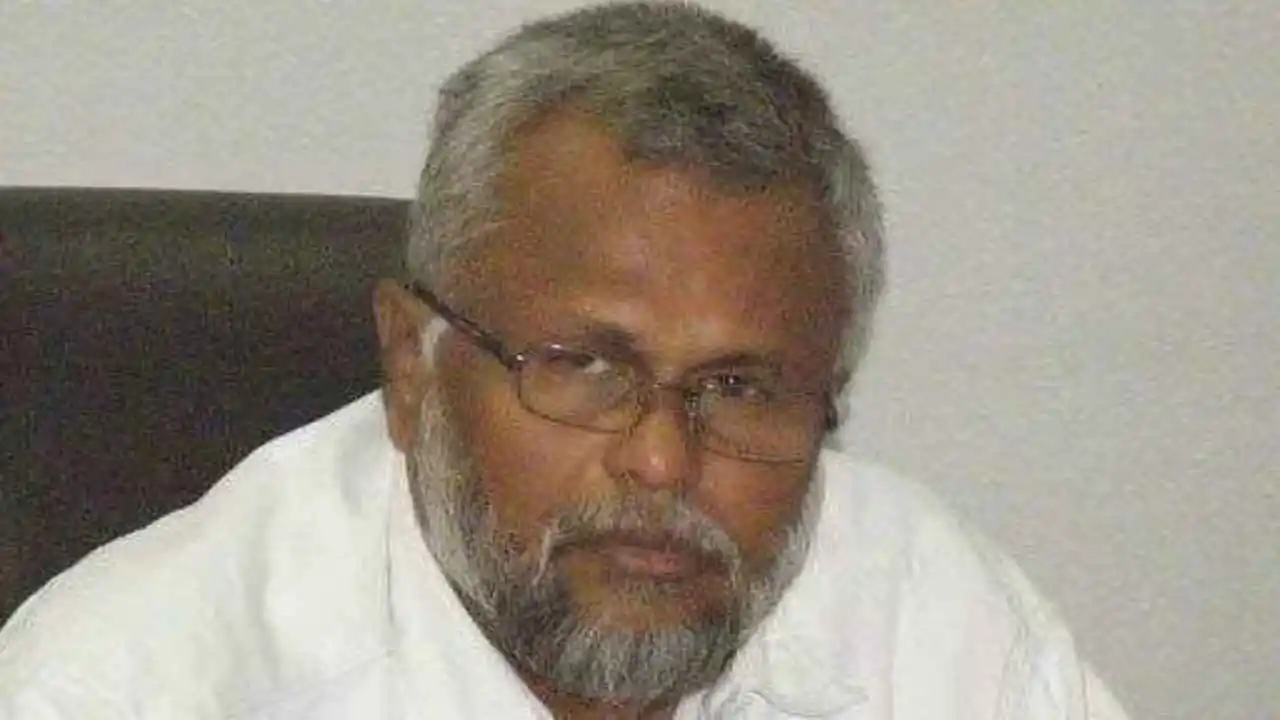
Sri Lankan Minister Douglas Devananda has said the statements from some political leaders in India on reclaiming Katchatheevu from the island nation have no ground. He told the media on Thursday that it is not unusual to hear such claims and counterclaims about the strategic island as elections are taking place in India.
The Sri Lankan Minister said he thought India is acting on its interests to secure this place to ensure Sri Lankan fishermen would not have any access to that area and that Sri Lanka should not claim any rights in that resourceful area. According to the 1974 agreement, Devananda said Indian and Sri Lankan fishermen can go fishing in the territorial waters of both countries until the pact was reviewed and amended in 1976.
The amended agreement resulted in fishermen from both countries being barred from fishing in neighboring waters. India’s ministry of External Affairs (MEA) on Thursday steered clear of the row surrounding Katchatheevu island. To a volley of questions on the Katchatheevu issue, MEA spokesperson Randhir Jaiswal reffered to External affairs Minister S Jaishankar’s recent comments on the matter.
He said he would like to talk about the issue that has been raised. He added the External Affairs minister has spoken to the press here in Delhi and also in Gujarat and has clarified all the issues. He said everyone should look into the press engagements and they would find the answers to their questions there.
The remarks from Devananda, a Sri Lankan Tamil, came days after the Narendra Modi government accused the Congress and its ally DMK in Tamil Nadu of overlooking national interests by handing over Katchatheevu island to Sri Lanka in 1974. The BJP has also been slamming the 2 parties for not ensuring the rights of the fishermen wanting to fish in waters around the island.
-
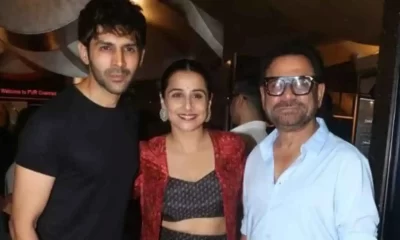
 Entertainment14 hours ago
Entertainment14 hours agoBollywood stars Vidya Balan, Kartik Aaryan, Pratik Gandhi, Ileana D’Cruz, Mouni Roy, Radhika Madan, Mrunal Thakur attend Do Aur Do Pyaar premiere
-
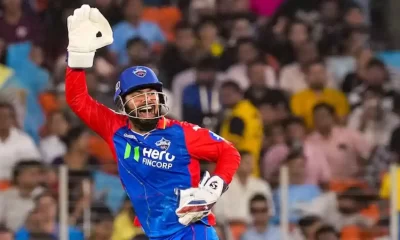
 LATEST SPORTS NEWS18 hours ago
LATEST SPORTS NEWS18 hours agoIPL 2024: Delhi Capitals thrash Gujarat Titans by 6 wickets
-
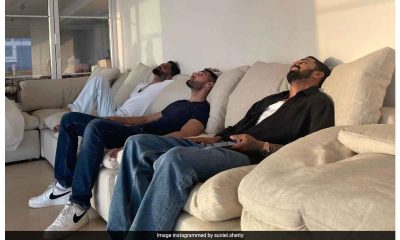
 Cricket news12 hours ago
Cricket news12 hours agoHappy Birthday KL Rahul: Suniel Shetty wishes son-in-law KL Rahul on his 32nd birthday
-
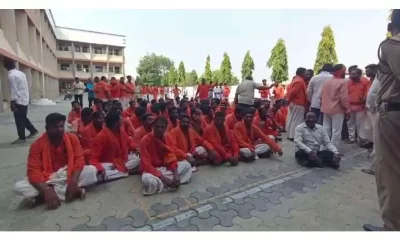
 India News15 hours ago
India News15 hours agoReligious outfit vandalises The Blessed Mother Teresa High School in Telangana after teachers object to students wearing Hanuman Deeksha dress
-
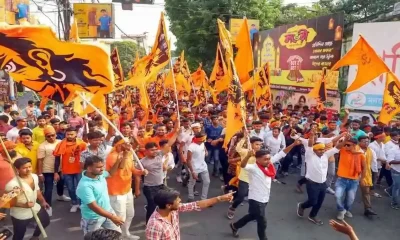
 India News17 hours ago
India News17 hours agoClashes erupt during Ram Navami procession in West Bengal’s Murshidabad district
-
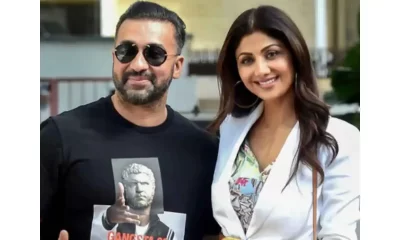
 India News11 hours ago
India News11 hours agoEnforcement Directorate seizes Shilpa Shetty’s husband Raj Kundra’s properties worth Rs 97 crore
-
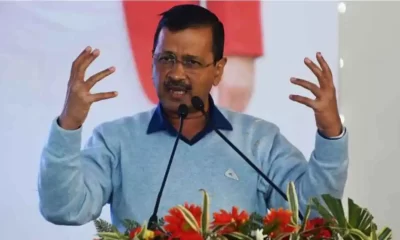
 India News10 hours ago
India News10 hours agoEnforcement Directorate says Arvind Kejriwal is deliberately eating mangoes, sweets, taking sugar with tea to increase his blood sugar level and create ground for bail

